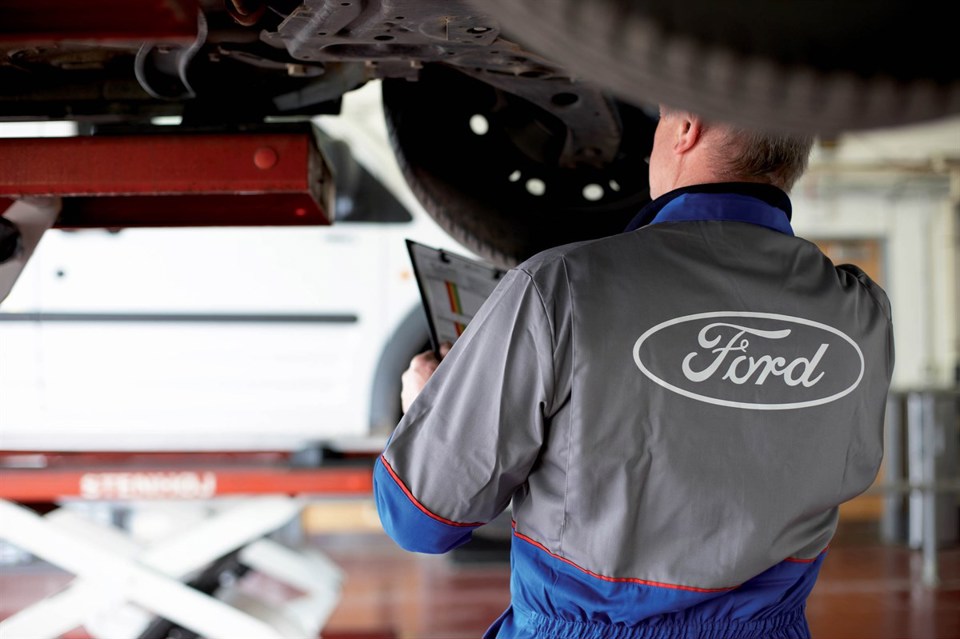Ford has launched a no-fee accident management programme after declaring the current business model used by fleets is broken.
It says inflated costs are leading to increased insurance premiums, while its model follows the recommendations of the House of Commons transport committee in creating a transparent and efficient programme, which will drive down the total costs of claims.
“Ford’s accident management programme is great news for customers,” said Paul McDermott, Ford collision repair manager. “It takes over many complex parts of the repair process such as contacting the insurance company, organising vehicle recovery and providing a courtesy car, with a single phone call.”
Ford told Fleet News that the current fleet accident management business model works by firms taking fees from fleet customers.
Personal injury referral fees are also taken from solicitors in exchange for non-fault drivers’ names, while so-called ‘claims farming’ of accident victims takes place, where drivers are encouraged to make personal injury claims.
In addition, credit hire charges are inflated, with ‘general terms of agreement’ rates being charged at a far higher rate than the cost of providing courtesy vehicles.
Ford also said that it was financially beneficial to accident management companies if repairs took longer than necessary, because it extended the need for credit hire vehicles.
“By not inducing spurious personal injury claims, by not taking any fees for personal injury referrals, by supplying hire vehicles at cost plus a small admin fee, we will reduce costs to insurers,” said McDermott.
“We hope over time that this will reduce the cost of insuring our vehicles, but we can only do so much as a single manufacturer. We are lobbying the Government to use our model as a blueprint for the industry and would like to see personal injury referral fees banned.”
It’s a view shared by the Association of British Insurers (ABI). Malcolm Tarling, of the ABI, said: “Referral fees encourage frivolous and exaggerated compensation claims, and lead to people being plagued by phone calls and texts encouraging them to claim.
“Such claims, and the high legal costs in the current system, push up motor insurance premiums.”
The scheme is available for Ford and non-Ford vehicles. Ford will make a return from parts sales, provision of Ford rental vehicles and, over time, vehicle sales.
McDermott said: “We make no revenue from non-Fords but recognised that we needed an all-makes solution for fleets and we hope that fleets will value this when they make purchase decisions in future.”
In the event of an accident, the driver will call a single freephone number. Specialist fleet claims managers and insurance claims outsourcers, The Innovation Group, will handle the first notification of loss calls.
The vehicle will then be directed to an accident repair centre, or recovered where it cannot be driven, and the customer is given a courtesy car.
But with many contract hire companies offering accident management programmes as part of their service, there was a cautious welcome from the leasing industry.
John Lewis, chief executive of the British Vehicle Rental and Leasing Association (BVRLA), said: “Accident management is not a new idea.
“It has been around for a long time and was introduced to meet the needs of drivers, who weren’t getting any help from manufacturers at the time.
“Ford has now recognised that this sort of service can drive extra business into its repair network.
“Let’s hope that the speed, quality and convenience of the repair work can meet the promises made at the front end of the service.”
Ford says the average total insurance motor claim of £4,583 consists of a repair cost of £1,100, while the remaining £3,483 – 76% of the overall cost – is down to personal injury and credit hire costs.
The manufacturer said that not inducing spurious personal injury claims and not taking fees for personal injury referrals will help reduce costs to insurers and, in time, possibly premiums.





















philwebb - 05/08/2011 12:15
Arrogant and frankly incorrect comments from a company that clearly has not done its research. As Paul Lewis says, accident management is not new and there are plenty of extremely effective operations working in the fleet market who drive out cost and consistently deliver innovative products and services that make a real difference. Having an outsourced over branded solution designed to drive repairs into your own dealer network isn’t exactly the best way to reduce cost and certainly does not reflect current market thinking. Nothing to write home about!!